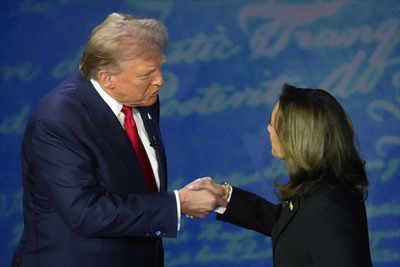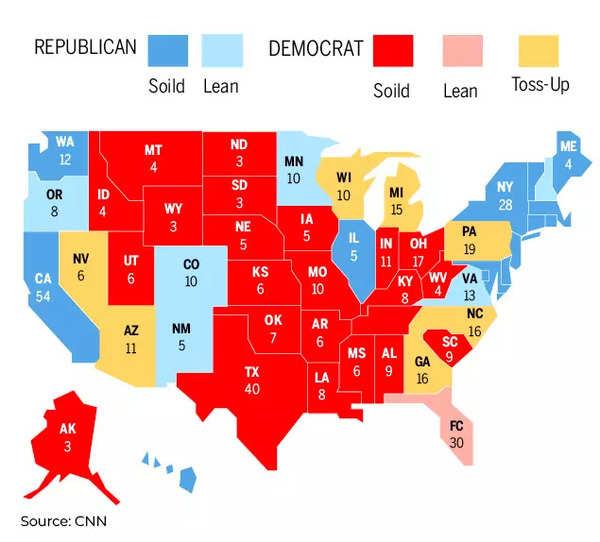 Many opinion polls suggest Harris is gaining momentum after debate with Trump. Nebraska, a traditionally Republican state that uniquely splits its electoral votes, has become a surprising focal point in the 2024 presidential election. At the center of this controversy is state Senator Mike McDonnell, whose defiance may thwart Trump’s carefully crafted plan to block Vice President Kamala Harris from winning a critical electoral vote—and, possibly, the presidency.
Many opinion polls suggest Harris is gaining momentum after debate with Trump. Nebraska, a traditionally Republican state that uniquely splits its electoral votes, has become a surprising focal point in the 2024 presidential election. At the center of this controversy is state Senator Mike McDonnell, whose defiance may thwart Trump’s carefully crafted plan to block Vice President Kamala Harris from winning a critical electoral vote—and, possibly, the presidency.
The Nebraska conundrum
Nebraska, along with Maine, is one of only two states that allocate their electoral votes by congressional district rather than using a winner-take-all system. This unique approach has allowed Democrats to potentially secure a single electoral vote from Nebraska’s 2nd Congressional District, which includes Omaha and its suburbs.
The significance of this single vote cannot be overstated. In a tight race, it could provide Vice President Kamala Harris with the 270 electoral votes needed to win the presidency, assuming she secures victories in key battleground states like Wisconsin, Michigan, and Pennsylvania.
Republicans, sensing the threat posed by Nebraska’s unique system, have been pushing to revert to a winner-takes-all model. Trump himself has personally lobbied state legislators to make the change. “It comes down to one electoral vote. I want you to understand what that one vote would mean,” said Senator Lindsey Graham, a staunch Trump ally, who visited Nebraska to persuade lawmakers to shift the state’s voting rules.
Why Nebraska natters
The GOP’s urgency in Nebraska stems from a specific electoral scenario that could play out on Election Day. If Harris manages to win the crucial “blue wall” states—Michigan, Pennsylvania, and Wisconsin—but Trump wins key swing states like Arizona and Georgia, the race could come down to a single electoral vote. That vote, potentially awarded by Nebraska’s 2nd Congressional District, would hand Harris the presidency.
Republicans argue that this vote is too important to leave in play. Senator Graham underscored the national security implications, saying, “It’s not just about Nebraska—it’s international consequences.” But McDonnell’s resistance leaves Trump’s allies scrambling to find another path forward. Even if Republicans did manage to secure a late change, some experts argue the backlash from voters in Omaha, who value their independent role in national elections, could backfire on the GOP.
McDonnell’s decisive “No”
Despite intense pressure from national Republicans, Senator Mike McDonnell, a former Democrat turned Republican, has steadfastly refused to back the change. His vote is crucial. Without his support and the support of two other key holdouts, Republicans do not have the supermajority required to override a filibuster in Nebraska’s unicameral legislature.
In a public statement, McDonnell made his position clear: “43 days from Election Day is not the moment to change how Nebraska votes.” He further emphasized that any changes to the state’s electoral process should be made by the voters, not through last-minute amendments pushed by out-of-state interests. His firm stance has effectively killed any immediate chance of moving to a winner-take-all system before the election.
Trump’s response was swift and furious. Taking to his Truth Social platform, he lambasted McDonnell as a “grandstander” and a “Democrat turned Republican(?)” who sabotaged a potential Republican victory. Despite this, McDonnell held firm, reaffirming his commitment to maintaining Nebraska’s current system.
National implications
The push to change Nebraska’s voting system highlights deeper issues in the US electoral process. As one of only two states that splits its electoral votes, Nebraska’s approach was initially intended to make elections more democratic by reflecting voter preferences more accurately. Yet, as this year’s political maneuvering demonstrates, it can also be manipulated to serve partisan agendas.
This battle in Nebraska is a microcosm of larger attempts by Republicans, led by Trump, to reshape election rules in their favor. As MSNBC’s Hayes Brown pointed out, “Trump is constantly lying about his political adversaries unfairly attacking him… [yet] these same Republicans talk about this naked attempt to weigh the dice in Trump’s favor in Nebraska as if it’s only fair.”
The ripple effect
The fallout from McDonnell’s decision extends beyond Nebraska. In Maine, the only other state that splits its electoral votes, Democrats were reportedly prepared to adopt a winner-take-all system if Nebraska did the same. However, it’s now too late for any such changes to take effect in time for this election cycle.
Meanwhile, national polls suggest Harris is gaining momentum. In an NBC News poll, Harris leads Trump by five percentage points, and her favorability ratings have improved significantly since she secured the Democratic nomination. If current trends hold, Nebraska’s single electoral vote may well decide the election.
(With inputs from agencies)
Source link : http://www.bing.com/news/apiclick.aspx?ref=FexRss&aid=&tid=66f2cfe04ec7429481f52c9e6c756768&url=https%3A%2F%2Ftimesofindia.indiatimes.com%2Fworld%2Fus%2Fnebraska-republican-mike-mcdonnells-stand-may-cost-donald-trump-us-presidential-election%2Farticleshow%2F113638797.cms&c=17498263662221053443&mkt=en-us
Author :
Publish date : 2024-09-24 03:33:00
Copyright for syndicated content belongs to the linked Source.




